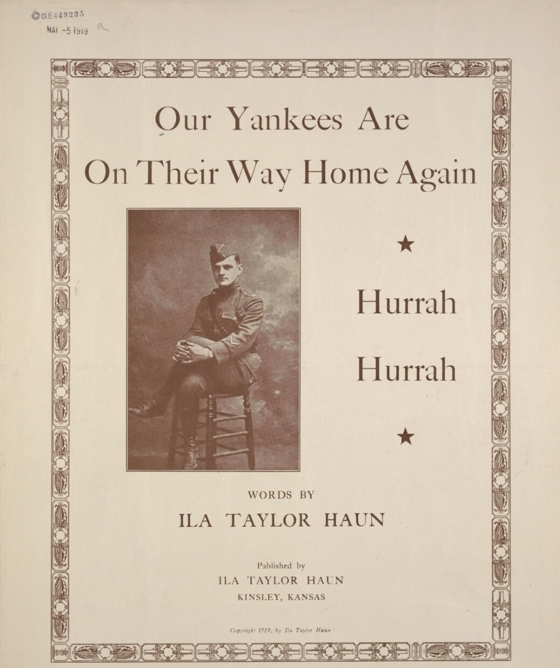By William F Wolfgang, PhD
Last week, we left Ila Taylor Hann Haun all settled into her life with her second husband, T.S. Haun. She was the library chairwoman, president of the Kinsley Women’s Club, and an advocate for the women’s vote. But world events stretched Ila’s personal resolve when her son departed for the muddied and bloodied trenches of France. The first World War raged and Gus left Lafalot for the front lines, starting with the Battle of Cantigny. He wrote home to his mother as often as he could. At times, when appropriate, his notes would be published in the Kinsley papers. Captain Augustus Hann barely escaped his service on the battlefield after being gassed and suffering several broken ribs.
Perpetually seeking to find light in the dark, Ila wrote patriotic music to honor the service of the American troops who risked everything. Her sheet music, “Our Yankees are on Their Way Home Again,” was published in April 1919 and featured a photo of Gus in uniform; it was a celebration. Storefronts throughout town proudly displayed the work of the town’s first published composer.
At times, when appropriate, his notes would be published in the Kinsley papers, which was previously covered in the library blog (see: #51 “A. P. Hann Writes from the Crossing). Captain Augustus Hann barely escaped his service on the battlefield after being gassed and suffering several broken ribs.
Unfortunately, the merriment was bittersweet. Around the same time the music was published, Ila’s second husband died at sixty-nine. Shortly after that, in early 1921, Ila Taylor Haun married for a third time, this time to businessman Allen Renick of Lawrence.
Ila Renick said farewell to her loving community and to “Lafalot in the Sandhills.” The couple relocated to Ponca City, Oklahoma.
Irrepressible as always, Ila found a new circle of friends in a writer’s club. There she shared her poems like “Sanctuary,” and “The Voice of the Pioneer Woman.” But perhaps most revealing, she wrote a piece alluding to her lifelong aversion entitled “Fleeting Shadows.”
Ultimately, she was never afraid to do what she needed to do. In 1937, at age seventy-five, she filed for divorce against her third husband, claiming he was habitually drunk. The divorce was granted, and the court also permitted her appeal to “restore” her first name, Ila Carmichael Taylor, discarding the remaining nomenclature of all three husbands. When she passed away four years later, in 1941, she was mourned by her beloved son, the veteran Captain Augustus Hann.
Ila’s postcard and her legendary “Lafalot” parties which I previously wrote about intrigued me, but her life story inspired me. Currently, her file in the Kinsley Library has only one poem, a tiny fraction of what she wrote throughout her life. More so, we still have no attributable photograph of her. By telling her story, someone may recall a folder, notebook, or dusty box, that could shine more light on the life and literary contributions of a talented writer and an incredible woman.
Note: The library reiterates Dr. Wolfgang’s call for searching old scrapbooks, photo albums, and dusty boxes for items that bring our local history to life. It is how the library archive was created and how it continues to grow. We also want to thank Dr. Wolfgang for all the research and writing he did for this series of articles.

